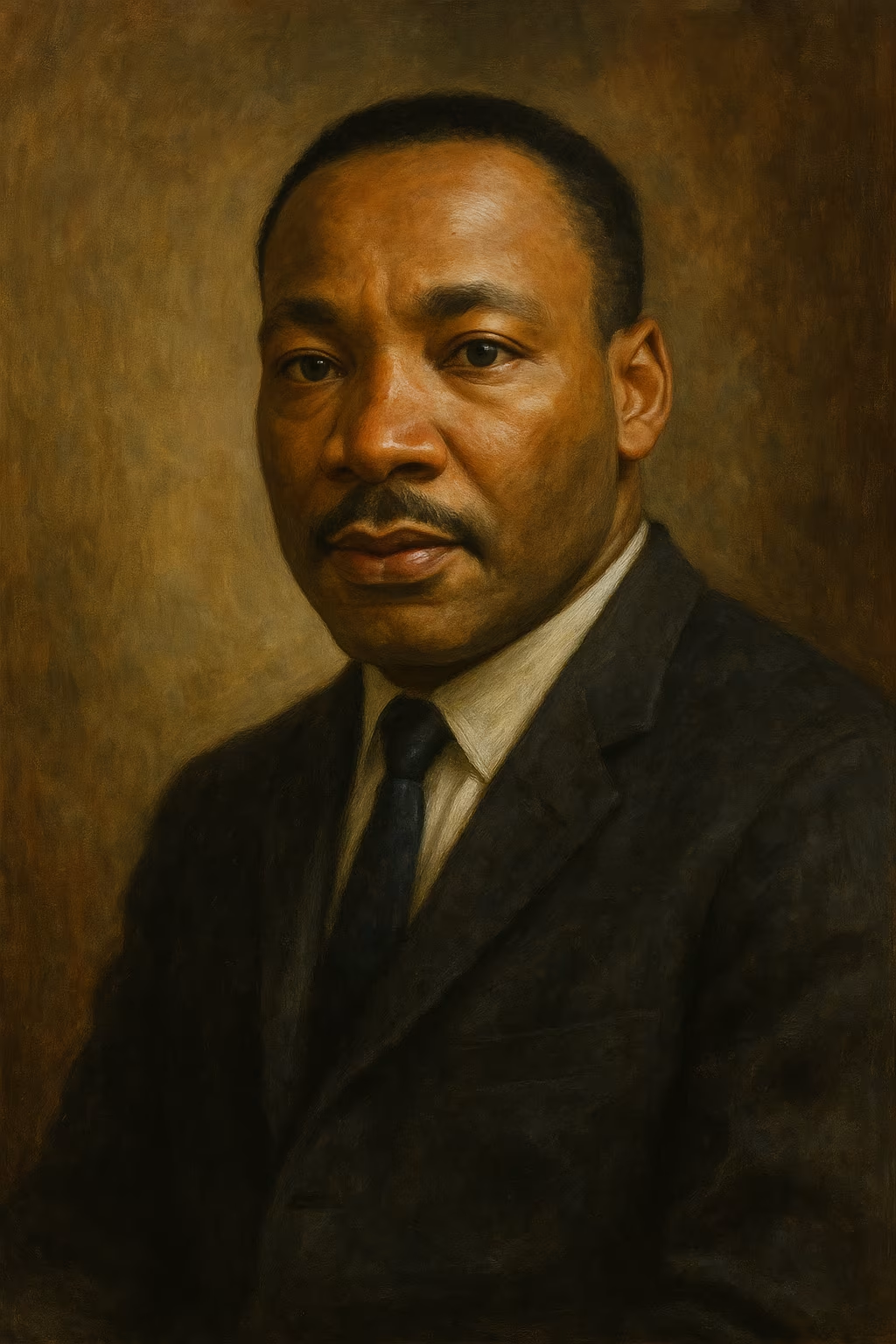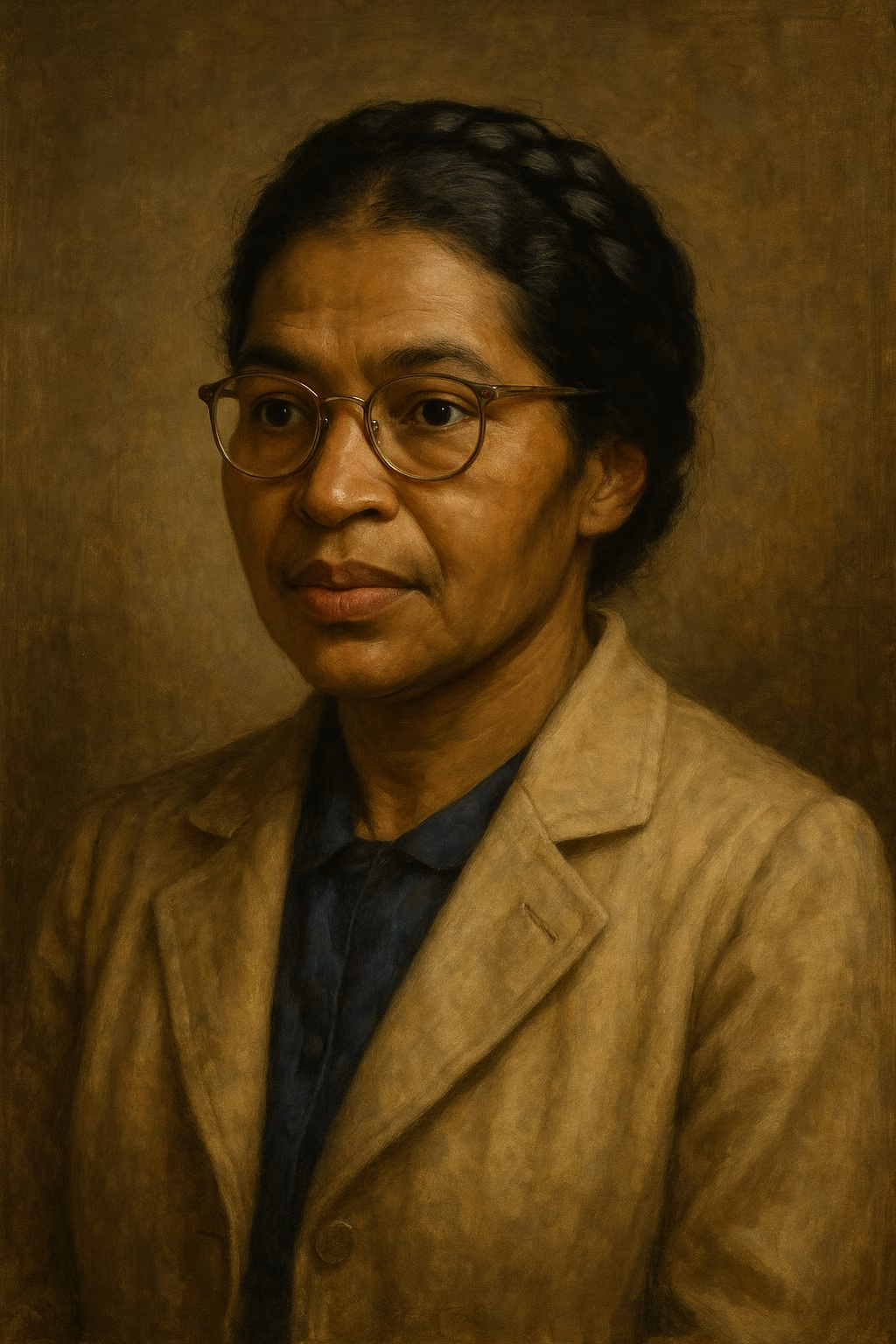Martin Luther King Jr. (1929 – 1968)
Quick Summary
Martin Luther King Jr. (1929 – 1968) was a baptist minister and major figure in history. Born in Atlanta, Georgia, United States, Martin Luther King Jr. left a lasting impact through Leadership of the Montgomery Bus Boycott (1955-1956).

Birth
January 15, 1929 Atlanta, Georgia, United States
Death
April 4, 1968 Memphis, Tennessee, United States
Nationality
American
Occupations
Complete Biography
Origins And Childhood
Martin Luther King Jr. was born into a prominent Baptist family in Atlanta’s Sweet Auburn neighborhood. His father, Martin Luther King Sr., led Ebenezer Baptist Church and campaigned for local civil rights, while his mother, Alberta Williams King, served as church musician and teacher. Raised amid faith, activism, and Black cultural pride, King received a disciplined education. He attended Yonge Street Elementary and the Atlanta University Laboratory School, skipping grades thanks to his academic talent and entering Booker T. Washington High School at age thirteen.
Education And Calling
As a teenager, King drew inspiration from his father’s sermons and from Benjamin Mays, president of Morehouse College, who advocated the social gospel. In 1944, at age fifteen, King enrolled at Morehouse through an early-admission program. He studied the writings of Thoreau, Niebuhr, and Gandhi, shaping his commitment to moral resistance. After earning a sociology degree in 1948, he attended Crozer Theological Seminary in Pennsylvania (1948-1951), where he led the student body and engaged with international classmates who broadened his perspective on anticolonial struggles. He completed a Ph.D. in systematic theology at Boston University in 1955, focusing on Paul Tillich and Henry Nelson Wieman, and honed his pastoral vocation at Dexter Avenue Baptist Church in Montgomery.
Historical Context
The American South of the 1940s-1960s remained dominated by Jim Crow laws, racial segregation, and white supremacist violence. The Supreme Court’s Brown v. Board of Education decision (1954) declared school segregation unconstitutional, yet implementation met fierce resistance. Lynching, economic discrimination, and Black voter suppression compounded rural poverty. Global decolonization and the Cold War heightened pressure on the United States to confront racism. Organizations such as the NAACP, CORE, and the Southern Christian Leadership Conference mobilized attorneys, pastors, and students to challenge the status quo.
Rise Of The Leader
In 1954, King accepted the pastorate of Dexter Avenue Baptist Church in Montgomery. When Rosa Parks was arrested on December 1, 1955 for refusing to surrender her seat, the Black community launched the Montgomery Bus Boycott. King was elected president of the Montgomery Improvement Association to coordinate the protest. He championed nonviolent action inspired by Gandhi, delivered galvanizing sermons, and endured threats, arrests, and the bombing of his home. After 381 days, the Supreme Court affirmed the unconstitutionality of bus segregation, thrusting King onto the national stage.
Major Campaigns
During the early 1960s, King and the SCLC orchestrated nonviolent campaigns across the South. In Albany, Georgia (1961), they confronted a police system intent on quelling protest. The 1963 Birmingham Campaign proved decisive: images of peaceful demonstrators attacked by dogs and fire hoses shocked the nation and spurred negotiations. While jailed, King wrote the "Letter from Birmingham Jail," a foundational defense of urgent justice. That same year, he helped lead the March on Washington, drawing more than 200,000 participants to the Lincoln Memorial. In Selma, Alabama (1965), the brutal "Bloody Sunday" attacks on voting-rights marchers catalyzed the Voting Rights Act.
Philosophy And Strategy
King anchored his activism in the Christian social gospel, Gandhian nonviolence, and American constitutional ideals. He regarded nonviolence as an active force for social change designed to morally disarm opponents. His rhetoric blended biblical references, American history, and poetic imagery, yielding extraordinary oratory. King emphasized "agape" love that refuses to dehumanize enemies and encouraged interracial coalitions. By the mid-1960s, he expanded his focus to poverty, unemployment, and the Vietnam War, articulating an interconnected vision of justice.
Criticism And Challenges
Despite international acclaim, King faced criticism from multiple fronts. Federal authorities—especially J. Edgar Hoover’s FBI—surveilled him, intercepted communications, and attempted to undermine his credibility. Some Black activists within the Student Nonviolent Coordinating Committee and the Black Power movement considered his strategy too conciliatory. Persistent violence against demonstrators and delays in implementing federal laws tested his faith in nonviolence. King also endured exhaustion, death threats, and intense family pressures while sustaining a grueling schedule of lectures and campaigns.
Final Engagements
From 1966 onward, King focused on economic inequality. The Chicago Freedom Movement exposed housing segregation and urban poverty in the industrial North. In 1967, his "Beyond Vietnam" speech in New York condemned U.S. intervention in Southeast Asia and linked militarism, racism, and materialism. He launched the Poor People’s Campaign to demand a national program for economic justice, envisioning a Resurrection City encampment in Washington. In April 1968, he traveled to Memphis to support striking sanitation workers, symbolizing the dignity of the working poor.
Assassination And Aftermath
On April 4, 1968, while standing on the balcony of the Lorraine Motel in Memphis, King was fatally shot by a sniper. James Earl Ray was arrested and convicted, though conspiracy theories persist. News of the assassination triggered uprisings in more than 100 American cities and worldwide mourning. Congress swiftly passed the Civil Rights Act of 1968 (Fair Housing Act), outlawing housing discrimination. Massive funeral processions in Atlanta confirmed King’s status as a martyr for social justice.
Legacy
King’s legacy endures through civil rights legislation, shifts in public consciousness, and inspiration for contemporary social justice movements. Martin Luther King Jr. Day, established in 1983, honors his commitment each January. His "I Have a Dream" speech and writings appear in school curricula. Museums, memorials, and research centers dedicated to King foster reflection on nonviolence. His intersectional approach informs current struggles against systemic racism, economic injustice, and police brutality in the United States and beyond.
Achievements and Legacy
Major Achievements
- Leadership of the Montgomery Bus Boycott (1955-1956)
- Founding and presidency of the Southern Christian Leadership Conference
- Organization of the 1963 March on Washington for Jobs and Freedom
- Key contributions to the Civil Rights Act (1964) and Voting Rights Act (1965)
- Nobel Peace Prize in 1964 for advancing nonviolent resistance
Historical Legacy
Martin Luther King Jr. profoundly reshaped American consciousness by demonstrating the moral and political power of nonviolent protest. His leadership produced major legislative victories, expanded Black political participation, and continues to inspire generations striving for equality, peace, and human dignity.
Detailed Timeline
Major Events
Birth
January 15, 1929 in Atlanta, into a family of Baptist ministers
Morehouse College graduation
Sociology degree and call to ministry
Doctorate and Montgomery Boycott
Boston University Ph.D. and leadership of the bus boycott
March on Washington
"I Have a Dream" speech at the Lincoln Memorial
Nobel Peace Prize
International recognition for nonviolent leadership
Selma and Voting Rights Act
Voting rights marches and passage of federal law
Assassination in Memphis
Death while supporting striking sanitation workers
Geographic Timeline
Famous Quotes
"The arc of the moral universe is long, but it bends toward justice."
"Injustice anywhere is a threat to justice everywhere."
"We must learn to live together as brothers or perish together as fools."
External Links
Frequently Asked Questions
When was Martin Luther King Jr. born and when did he die?
He was born on January 15, 1929 in Atlanta, Georgia, and was assassinated on April 4, 1968 in Memphis, Tennessee.
What was his role in the civil rights movement?
As leader of the Southern Christian Leadership Conference (SCLC), he coordinated nonviolent campaigns against segregation and racial injustice in Montgomery, Birmingham, Selma, and beyond.
Which speech is he best known for?
His "I Have a Dream" speech, delivered on August 28, 1963 during the March on Washington for Jobs and Freedom, has become a universal symbol of racial equality.
Why did he receive the Nobel Peace Prize?
The Nobel Committee honored him in 1964 for his moral leadership and nonviolent strategy to end racial discrimination.
What influence did he have after his death?
His legacy continues to inspire global movements for social justice and human rights, and the United States commemorates his life each year on Martin Luther King Jr. Day.
Sources and Bibliography
Primary Sources
- Martin Luther King Jr. – Autobiography
- Martin Luther King Jr. – Letter from Birmingham Jail
- Civil Rights Act of 1964
- Voting Rights Act of 1965
Secondary Sources
- Clayborne Carson – The Autobiography of Martin Luther King, Jr. ISBN: 9780446676502
- Taylor Branch – Parting the Waters: America in the King Years, 1954-63 ISBN: 9780684846316
- David J. Garrow – Bearing the Cross ISBN: 9780684830384
- Jeanne Theoharis – A More Beautiful and Terrible History ISBN: 9780807075499
- Peniel E. Joseph – The Sword and the Shield ISBN: 9781541617865
- Lonnie G. Bunch III – A Fool's Errand ISBN: 9781588346644
External References
See Also
Related Figures
Specialized Sites
Batailles de France
Discover battles related to this figure
Dynasties Legacy
Coming soonExplore royal and noble lineages
Timeline France
Coming soonVisualize events on the chronological timeline
